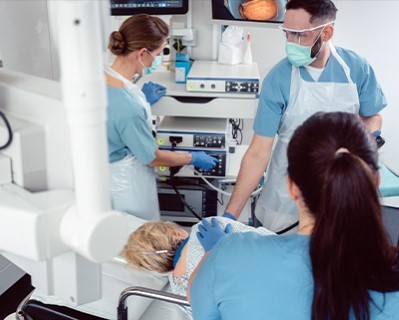Endoscopy
- Purpose: Examines the upper digestive system for diagnosis and treatment.
- Procedure: An endoscope, a flexible tube with a camera, is inserted through the mouth to examine the esophagus, stomach, and duodenum.
-
Note: The information provided here applies to elective endoscopy procedures under standard conditions. However, specifics may vary depending on individual patient factors, such as the presence of gastrointestinal conditions, patient tolerance, or any complications that might arise during or after the procedure. The patient’s overall health, the type of endoscopy (upper, lower, or specialized), and the need for additional interventions can also influence the procedure and recovery process.
Inpatient/Outpatient
Endoscopy is typically performed as an outpatient procedure. It is minimally invasive and allows most patients to return home the same day. The procedure is usually conducted in a hospital or specialized clinic, and patients are monitored for a short time afterward to ensure they recover safely from sedation.Hospital Stay Duration
Patients undergoing endoscopy generally do not require an overnight hospital stay. The procedure typically takes between 15 minutes to 1 hour, depending on the type of endoscopy being performed (e.g., upper endoscopy, colonoscopy). After the procedure, patients are monitored for a brief period to ensure they recover from sedation or anesthesia without complications, and they are usually discharged the same day.Type of Anesthesia
Endoscopy is usually performed under conscious sedation, which helps relax the patient and minimize discomfort while allowing them to remain partially awake. In some cases, particularly for longer or more complex procedures, general anesthesia may be used. Local anesthesia may also be applied to the throat if an upper endoscopy is performed.Travel After Procedure
Patients are generally advised to avoid driving and long-distance travel for the remainder of the day after the procedure, especially if sedation was used. Most patients can resume normal activities the following day, but they should follow specific recommendations from their healthcare provider regarding activity levels and travel.Pre-procedure Preparation
Preparation for endoscopy varies depending on the type of procedure. For upper endoscopy, patients are usually instructed to fast for several hours before the procedure. For colonoscopy, patients typically undergo a bowel prep the day before the procedure, which involves taking a laxative solution to clear the intestines. The healthcare provider will provide detailed instructions tailored to the specific type of endoscopy.Procedure Duration
The duration of an endoscopy procedure typically ranges from 15 minutes to 1 hour, depending on the complexity and purpose of the procedure. For example, a diagnostic upper endoscopy may take only 15-30 minutes, while a colonoscopy may take up to an hour, especially if polyps are removed or biopsies are taken.Recovery Time
Recovery from endoscopy is generally quick, with most patients able to resume light activities within a few hours after the procedure. If sedation was used, patients should rest for the remainder of the day and avoid making important decisions or operating heavy machinery. Full recovery and a return to normal activities usually occur within a day.Estimated Cost
The cost of an endoscopy can vary depending on the clinic, geographic location, and the type of endoscopy performed. Costs may also vary if additional procedures, such as biopsies or polyp removal, are performed during the endoscopy. For accurate cost information, patients should contact their healthcare provider or treatment center directly.Post-procedure Care
Post-procedure care for endoscopy involves monitoring for any signs of complications, such as bleeding, persistent pain, or difficulty swallowing (in the case of upper endoscopy). Patients should follow any dietary recommendations provided by their healthcare provider, which may include starting with a light meal after the procedure. Follow-up appointments may be necessary to discuss biopsy results or to plan further treatment if any abnormalities were detected.

